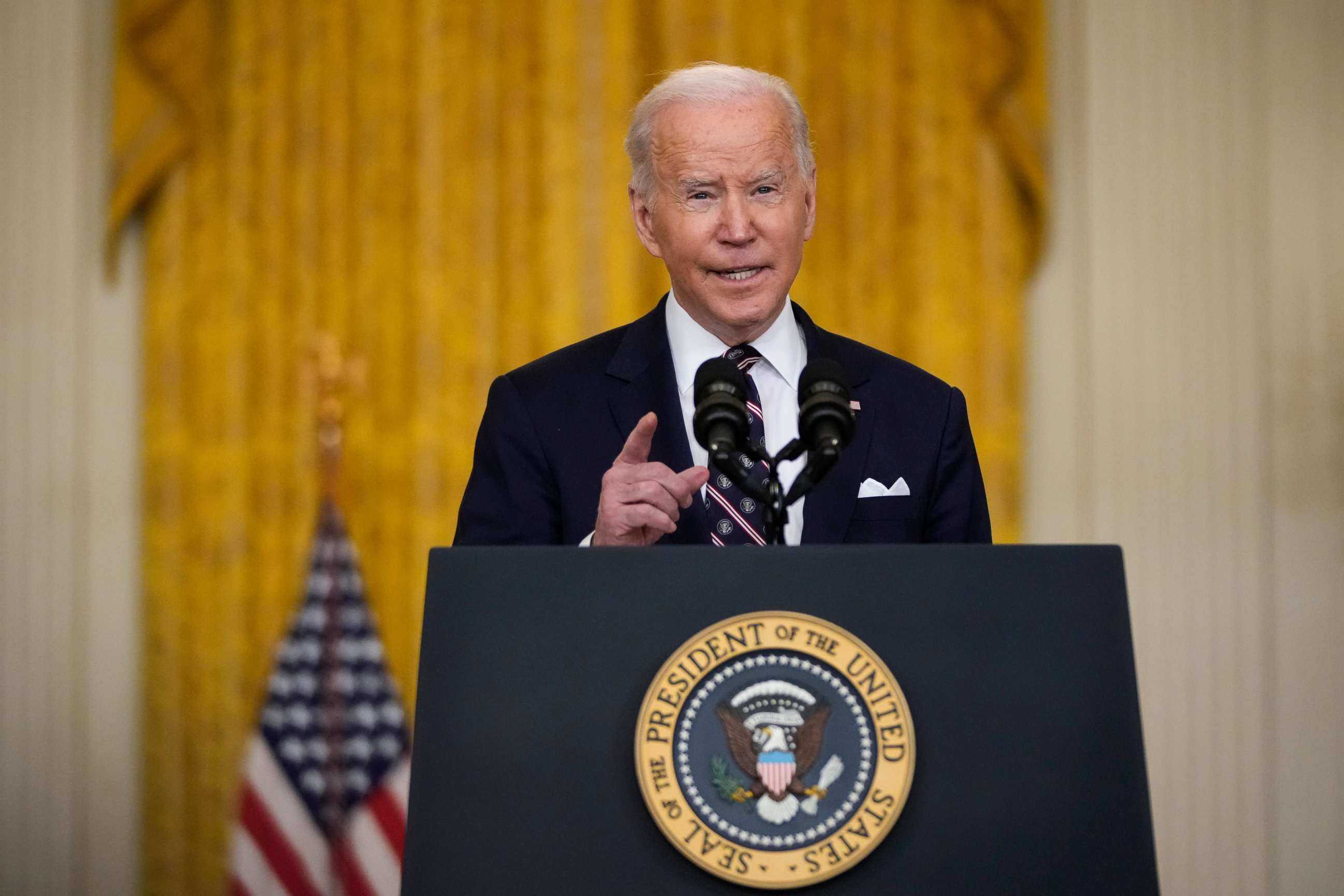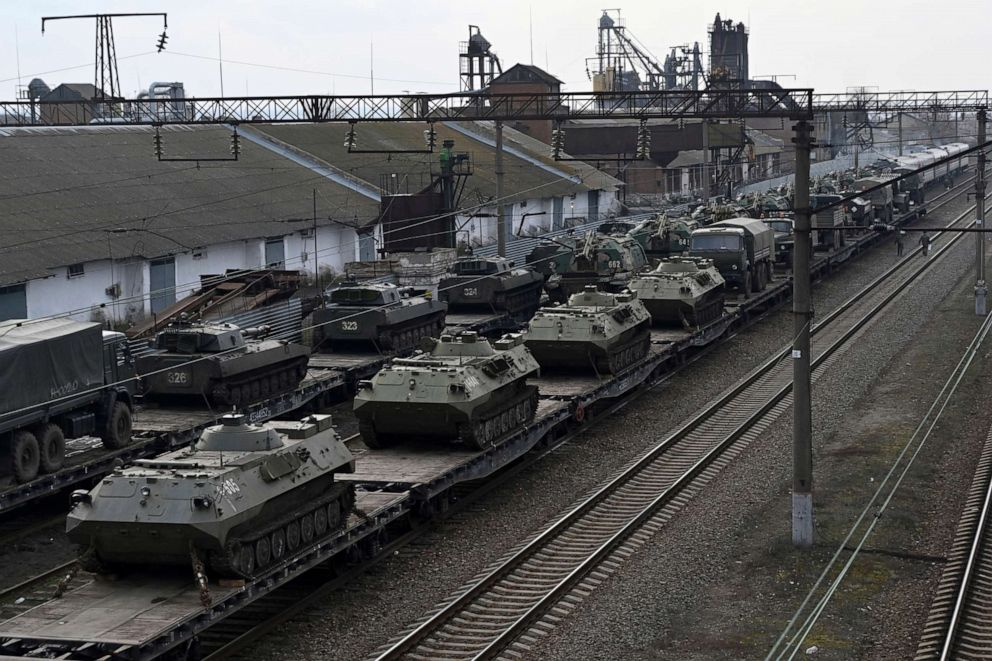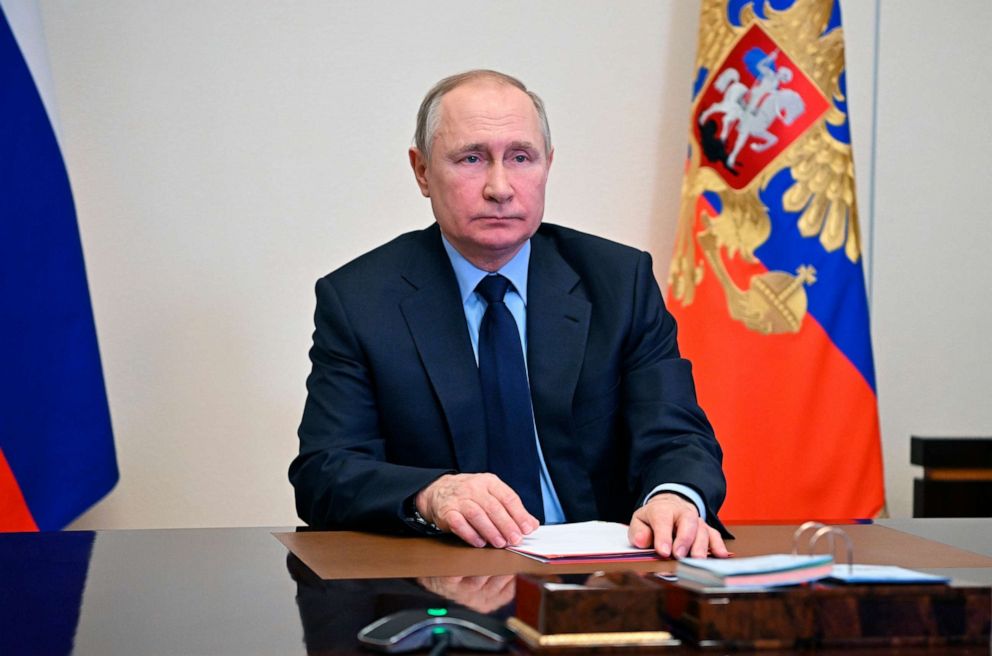What to know about economic sanctions and how they will affect Russia
The U.S. sanctions are meant to deter Russia from invading Ukraine.
In response to Russian President Vladimir Putin's decision to recognize the separatist-controlled Donetsk and Luhansk regions in Ukraine as "independent" states and to attack Ukraine, President Joe Biden announced two waves of sanctions against Russia.
Biden on Tuesday initiated sanctions, warning they could grow more severe. After Russia attacked Ukraine, Biden put in place escalated sanctions on Thursday, though not the full economic punishment Ukraine and others have called for including putting sanctions on Putin himself.
"Putin is the aggressor. Putin chose this war. And now he and his country will bear the consequences," Biden said Thursday.
Russia's foreign minister Sergey Lavrov told Russian state TV earlier this week that Russia was already "used to" sanctions and that it believes more sanctions would be imposed on Moscow regardless of what it does.
"That our [Western] colleagues are trying to push the blame on Russia for the failure of the Minsk agreements, we also understand," he said, referring to a truce Ukraine and separatists signed in 2014. "Our European, American, British colleagues won't stop and won't calm down as long as they haven't exhausted their possibilities for the so-called punishment of Russia."
What are economic sanctions?
Economic sanctions are defined by the Council on Foreign Relations as the withdrawal of customary trade and financial relations for foreign and security policy purposes. The sanctions can be comprehensive, which prohibit economic activity with an entire country, or targeted, which block transactions by and with specific individuals, businesses or groups.
These restrictions are placed on individuals or entities and prevent them from doing business with the country imposing those sanctions. Sanctions put in place by the U.S. government cut off an individual or entities from the American financial system, meaning they can no longer do business in the U.S. and all their assets under U.S. jurisdiction are frozen.

Americans and American businesses are also prohibited from doing business with these institutions, unless authorized by the U.S. Department of Treasury's Office of Foreign Assets Control.
Sanctions aim to impair the ability of the person or entity from being able to perform basic functions in the international financial system. They are used by the U.S. government depending on foreign policy and national security goals.
What sanctions did the US impose on Russia?
New sanctions were placed on Russia's biggest banks on Thursday, accounting for nearly 80% of all the banking assets in Russia, according to the Department of Treasury.
The new sanctions also targeted Russian elites and families and restrict Russia's ability to raise funds by adding additional prohibitions related to new debt and equity of major Russian state-owned enterprises and large privately owned financial institutions.
The U.S. also on Thursday put in place export controls in an effort to block Russia from being able to import technologies like semiconductors or software, which it needs to build out high-tech industries and the military. The U.S. sought to block Russia from importing these technologies manufactured anywhere in the world, so long as they contain American-developed components.
"There aren't a lot of semiconductors in the world that don't have an American component," said Tom Graham, an expert on Russia at the Council on Foreign Relations, to ABC News.
This follows an initial wave of sanctions placed on two Russian state-owned financial institutions and five Kremlin-connected elite on Tuesday, which targeted the Bank for Development and Foreign Economic Affairs, which is known as Vnesheconombank (VEB), and Promsvyazbank Public Joint Stock Company (PSB), along with 42 of their subsidiaries.
These sanctions, which targeted institutions specific to raising funds and Russia's defense sector, instead of institutions that ordinary Russians use, were not the most severe option available. This was a tactic, according to Julia Friedlander, a former Treasury Department official who worked on sanctions policy.
"The idea is that you can't blow all your options at once," Friedlander, who is now a fellow at the Atlantic Council, said earlier this week. "If you blow all your fire now, then what is Russia's incentive to hold back?"
According to the U.S. Treasury Department, VEB is crucial to Russia's ability to raise funds, and PSB is critical to Russia's defense sector. The two institutions and their subsidiaries hold combined assets worth tens of billions of dollars.
"Today's action constrains Russia's ability to finance defense-related contracts and raise new funds to finance its campaign against Ukraine," the Department of Treasury said in a statement Tuesday.

VEB, which finances Russia's national economic development, has an asset portfolio of $53 billion, making it one of Russia's top five financial institutions, according to the Treasury Department. Some of VEB's sanctioned subsidiaries include banks and other financial firms, electronic component producers and a coal mining group in Russia and three other countries.
PSB, Russia's eighth-largest bank, was designated by the government to finance the Russian Ministry of Defense and defense sector, according to the U.S. Department of Treasury. It services nearly 70% of Russia's defense contracts and provides banking and personal finance to Russian military personnel.
Influential Russians and their family members who are in Putin's inner circle and believed to be participating in the Russian regime's "kleptocracy" -- including the chairman and CEO of PSB -- were also sanctioned, the Department of Treasury said.
Will the sanctions have an effect?
The U.S. and its allies went after Russia's biggest banks in the second wave of sanctions announced Thursday, which would leave a greater impact on its economy, experts told ABC News.
"The bottom line is that these sanctions will have a significant impact on Russia's overall economy, and average Russians will feel the cost," Clay Lowery, executive vice president for the Institute of International Finance (IIF), a trade association that represents global banks, said in a statement Thursday. "These sanctions target Russia's domestic financial system, causing bank runs and forcing Russia's central bank to continue hiking rates."
The U.S. said it wanted to minimize the impact of sanctions on ordinary Russians, putting less severe restrictions on the country's largest bank, Sberbank, which handles a lot of pensions and salaries. The ordinary Russian won't be as directly impacted, but they will likely suffer from the many effects of a weakened economy.

"The whole idea is to destabilize the economy financially," said Maria Shagina, a sanctions expert at the Finnish Institute of International Affairs. "The indirect impact will reverberate through the whole system."
Jeffrey Schott, a trade expert at the Peterson Institute of International Economics, said the export controls are a significant step meant to "degrade" Russia's economy over the long-term.
"Those export controls won't have an immediate impact on Russian capabilities," he said. "They will have a corrosive effect on the development and growth of Russian industry and military. The damage builds up over time."
Schott said this is a strategy that has worked during the trade war between the U.S. and China in 2019. The U.S. imposed export controls on Chinese tech giant Huawei, which has been successful in hampering the company's access parts to make smartphones and other technologies.
Russia has been preparing for sanctions, said Andrew Lohsen, a former officer with the Organization for Security and Cooperation in Europe (OSCE) Special Monitoring Mission to Ukraine, earlier this week. Sberbank has reportedly been testing its ability to survive without access to Western software. It also has hundreds of billions in foreign currency reserves and in a national wealth fund.
"The Russian economy has worked to sanction-proof itself since 2014," Lohsen, a fellow at the Center for Strategic and International Studies, told ABC News. "But at the end of the day, my concern is that Russia will just force its citizens to tighten its belts and will just proceed with this empire building project that it's set for itself in Ukraine."
He questioned whether the limited sanctions put in place earlier this week will be enough to deter Russia.
"Can anything deter Putin," he said, "short of return fire?"
ABC News' Ben Gittleson contributed to this report.




